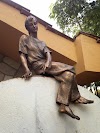Visiting the communities "unannounced" has its own risks. Even more when you do not have anyone to show you the way or help you when things do not go as planned.
During the week I asked Fr Mabuza (Good Shepherd parish) to indicate another two or three communities where I could go and celebrate Mass on Sunday. Good Shepherd is the parish with the highest number of outstations in the diocese. It has more than 20 and I had already visited 16.
It was supposed to be "easy": "The first Mass will be at 11 am at Mpaka Primary School near the Refugee Centre" he wrote to me.
As I knew where the Refugee Centre was and there was no need for anyone to guide me there, I made sure I would be there early and find the school. No problem.
I arrived about half an hour early. The classrooms of the school are used by different Christian denominations at more or less the same time. While I was waiting outside, someone came and invited me to join them: "Come inside and worship the Lord with us". I thanked her and explained I was waiting for the Catholics to arrive.
Something more or less similar happened a short while later while I was walking around. Someone (probably the pastor of another denomination) invited me to go into the classroom and sit down with a couple of people who had already arrived. I must confess that I enjoy the fact that many people do not know who I am.
I then realized that the Catholic community would not be there and decided to drive back home. Before leaving I sent an sms to Fr Mabuza to let him know. Five minutes' later there was a call from one member of the community: "Bishop, where are you? We are having problems with the key of the classroom allocated to us and therefore we moved the celebration to the house of a family. Wait for us wherever you are. We'll bring you here". It was so.
It is a very special community because they welcome members of the refugee centre who have arrived in Swaziland from other parts of the continent. They hardly know SiSwati and therefore both SiSwati and English are needed. They are a great expression of our being "Catholic".
At the end of the Mass everyone thanked the bishop for his presence among them. I encouraged them to make sure everyone feels "at home" both in the country and in our Church.
The refugees (mainly from Rwanda) asked to sing the Magnificat in their local language as final hymn and their own way to say "thank you".




